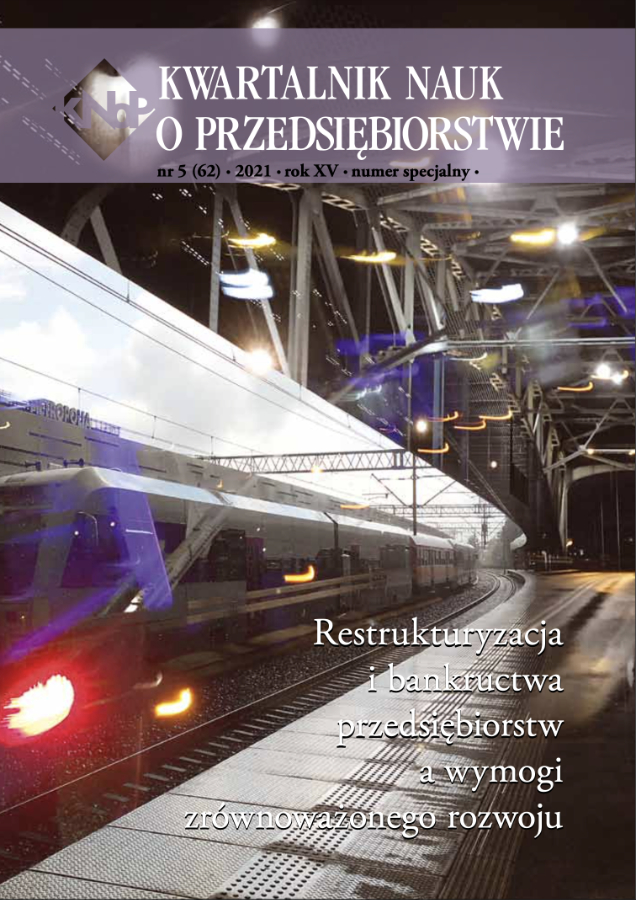The role of leasing in promoting electric cars
Main Article Content
Abstract
The popularity of leasing in Poland translates into the growth of all segments of this market. However, the dynamics of individual segments and their structure differ. The share of the light vehicle segment is growing particularly fast and it is the automotive market that is of the greatest importance here. Environmental investment projects are playing an increasingly important role and that is why leasing companies offer financing to companies, especially from the small and medium-sized enterprise sector, in the field of energysaving equipment and materials. These projects have a positive impact on the Polish economy and increase the competitiveness of enterprises, as well as reduce carbon dioxide in our country. The study formulates the following hypothesis: that leasing has a significant impact on the increase in the use of electric cars and is the most popular form of using these vehicles. After conducting the analysis, it was found that the thesis was confirmed. Leasing currently occupies an unquestionable, high position in Poland in financing the activities of enterprises.
Downloads
Article Details
The author of the article declares that the submitted article does not infringe the copyrights of third parties. The author agrees to subject the article to the review procedure and to make editorial changes. The author transfers, free of charge, to SGH Publishing House the author's economic rights to the work in the fields of exploitation listed in the Article 50 of the Act of 4 February 1994 on Copyright and Related Rights – provided that the work has been accepted for publication and published.
SGH Publishing House holds economic copyrights to all content of the journal. Placing the text of the article in a repository, on the author's home page or on any other page is allowed as long as it does not involve obtaining economic benefits, and the text will be provided with source information (including the title, year, number and internet address of the journal).
References
com.pl/finanse/leasing-samochodow-elektrycznych-czy-to-sie-oplaca/61vfr6p, dostęp 27.05.21.
2. Grzywacz J.(2020), Leasing, Oficyna Wydawnicza SGH, Warszawa.
3. Informacja prasowa ZBL i PZPM (27.05.21), Leasing napędza elektromobilność – kiedy zobaczymy
milion „elektryków” na polskich drogach, Związek Polskiego Leasingu i Polski Związek Przemysłu
Motoryzacyjnego.
4. Parlament Europejski (2019), Rozporządzenie Parlamentu Europejskiego i Rady (UE) 2019/631 z dnia
17 kwietnia 2019 r. określające normy emisji CO2 dla nowych samochodów osobowych i dla nowych
lekkich pojazdów użytkowych oraz uchylające rozporządzenia (WE) nr 443/2009 i (UE) nr 510/2011.
5. Polish EV Outlook 2020 (2020), Kompleksowa analiza rynku elektromobilności w Polsce, Polskie
Stowarzyszenie Paliw Alternatywnych.
6. Prnews (2021), Eko Leasing PolSEFF w Banku BGŻ BNP Paribas, https://prnews.pl/eko-leasing-polseffw- banku-bgz-bnp-paribas-8363, dostęp 27.05.21.
7. PSPA (2021), ELAB Miasto Czystego Transportu. Największy projekt badawczy komercyjnego wykorzystania pojazdów elektrycznych w Polsce i w regionie CEE, Polskie Stowarzyszenie Paliw Alternatywnych.
8. Raport KPMG (2019), Global Automotive Executive Survey 2019, https://assets.kpmg/content/dam/kpmg/pl/pdf/pl-raport-kpmg-internationali-global-automotive-executive-survey-2019.pdf, dostęp 27.05.21.
9. Raport PZPM i ACEA (2020), W kierunku zeroemisyjnej mobilności. Czynniki determinujące rozwój napędów alternatywnych w samochodach osobowych i dostawczych w Unii Europejskiej, Raport Polski Związek Przemysłu Motoryzacyjnego i ACEA.
10. Raport Santander (2018), Zielone inwestycje, Raport odpowiedzialnego biznesu 2018, https://raport.santander.pl/przyjazny/przyjazny-dla-srodowiska/zielone-inwestycje/, dostęp 27.05.21.
11. Santander Leasing (2021), Czy eko-leasing podbije polski rynek aut elektrycznych?, https://santanderleasing.pl/ biuro-prasowe/komunikaty-prasowe/czy-eko-leasing-podbije-polski-rynek-aut-elektrycznych.html, dostęp 27.05.21.
12. Ustawa (2016), Ustawa z dnia 20 maja 2016 r. o efektywności energetycznej (Dz.U. 2016 poz. 831).

